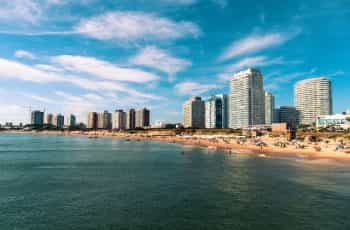No New Casinos in Mexico Under President Obrador
In a recent statement, Mexican President Andrés Manuel López Obrador (also called AMLO) has acknowledged deference to the Catholic Church, stating there will be no new casinos licensed under his administration. This restriction on licensing will last, then, until at least 2024, and poses a challenge to a new project underway by Codere.
What Are The Existing Gambling Laws in Mexico?
Casinos were made legal in Mexico in 2004 under legislation passed by then-President Vicente Fox. Since that time, a huge number of casinos have opened in the country — with 31 states spanning Mexico, each state contains at least 1 casino, including those on the coast bordering the US.

Mexico’s President Obrador (also known as AMLO) will be leading the country until 2024 ?Independent
In addition to full-service casinos with roulette, blackjack, and poker in high-touristed areas like Cancun and Tijuana, Mexico has a robust sports betting scene, with some saying it’s the most popular form of betting in the country.
As with many other countries, online gambling has posed an interesting question to existing gambling laws. At this time, online gaming hovers somewhere between legal and illegal — users are allowed to participate in online gambling so long as the owning company is not based in Mexico.
Speculation of Hard Rock International and Codere Resort, Now at Risk
For months, speculation has been brewing over a potential joint-venture resort by Hard Rock International and Codere: a guitar-shaped resort and casino modeled after Hard Rock’s soon-to-be-opened South Florida venture, this time in Mexico City, to the tune of $1 billion. According to sources, Codere is slated to invest $360 million in the Hard Rock Café resort-casino venture. In addition to a casino, plans for the massive new resort imagine the building to be a breathtaking 48 stories tall, and including dining and entertainment options. Plans for the building were never finalized, nor was the project ever publicly announced. However, speculators can be fairly certain President Obrador’s latest proclamation will put any possibility of the casino component of this joint venture to rest.
Stocks Falling for Codere, but Sights Remain on Mexico
Codere, a Spanish-based company working to build its base in Latin America, suffered 6.7% losses (a net loss of €3.6 million, about $3.9 million) in the first quarter of this year. The company explained its falling income as a result of plummeting exchange rates in Argentina.
Mexico’s market remains of great interest to Codere, which currently operates 95 gaming venues in the country. The company has also been in talks with Credit Suisse to acquire an additional 17 gaming venues through Televisa, a major media conglomerate in Mexico.
An Attack Now Several Years Past, But A Scar Remains
Many speculate President Obrador’s hardline stance against new casinos in Mexico is out of deference to the Church, whose leading bishop, Cardenal Rogelio Cabrera, stands in opposition to gaming activity after the devastating 2011 bombing of the Casino Royale in Monterrey.
On August 25, 2011, members of a prominent drug cartel set the Casino Royale in Monterrey, Nuevo León ablaze. 52 innocent civilians were killed in the fire, and an additional 10 were injured. This tragic event spurred the clergy in Mexico to more actively oppose gaming activity.
El Presidenté’s Opposition is No Surprise
As early as 2005, President Obrador commented, “there is no need to allow casinos,” and that to look elsewhere for revenue “instead of hurting us, benefits us”. In addition to curbing casino licensing, Mexico’s government will also seek to set more restrictive rules on the gaming industry, which makes an estimated 30 billion pesos ($543 million) annually.
What Does the Future Hold for Existing Mexico Casinos?
The two major casino corporations in Mexico are Caliente, a local company, and Codere. With tensions rising between the US and Mexico, it’s likely tourism from US-American citizens will dwindle due to increased difficulty accessing casinos over the border (particularly in states like California and Texas, where there is a high number of Native American-owned casinos).
Because of less accessibility to casinos in the US, local gamers in Mexico participating in legal gaming will have to choose between two local options, Caliente and Codere. For the last several years, Mexico has been viewed as particularly promising in the landscape of Latin American casinos, and international companies have been staking their claims: in June 2019, UK-based online sports brand Bet365 became available in Mexico, aided by a TV Azteca subsidiary.
In fact, though, it’s possible President Obrador’s opposition to new casinos could be a great boon to Mexico’s existing casinos. With less new competition on the horizons, patrons of legal gambling establishments will have fewer choices — and thus, more profit for a few bigger names.
 Online Casinos UK
Online Casinos UK



